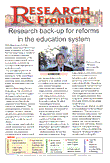 |
| GETTING AHEAD | |
| > | Read English story books outside schools |
| > | Double check homework |
| > | Listen to English radio programmes |
| > | Speak more English in class |
| > | Watch English TV programmes |
| > | Learn the spelling of new words |
| > | Do Supplementary English exercises |
| > | Revise new words |
The research on English learning found that children from mainland China who had newly-arrived in Hong Kong and joined Primary 2 classes were noticeably behind their local counterparts.
However, they learned basic-level skills such as letter naming and word reading at a faster rate and were able to catch up. High concentrations of immigrant students actually facilitated the learning of basic-level skills for the whole class.
The opposite was true with high-level skills such as conversation and writing; immigrant children fell increasingly behind their local counterparts, and slowed down learning in the whole class.
At Primary 4 level, the inclusion of immigrant children in classes had no effect on the learning process, either positive or negative. It was, therefore, relatively difficult for them to catch up with local students in both higher and basic skills. Results, say researchers, justify pulling out immigrant students from mainstream classes for special catch-up sessions each week. Through in-depth interviews, researchers compiled a list of out-of-classroom activities that help language learning.
In the research comparing the Chinese vocabulary performance of more than 3,000 secondary and university students in Hong Kong, Taipei, Singapore, and Shanghai, it was found that Shanghai performed best, followed by Hong Kong, Taipei, and Singapore.
Hong Kong and Taipei students showed faster development in their junior secondary school years, followed by slower development in senior secondary school years. Said Principal Investigator Prof Benjamin Tsou: "This is the first-ever large scale comparative scientific study of Chinese vocabulary knowledge with timely and topical relevance in Hong Kong, if not the other communities." The research was completed in October last year.
Principal Investigators >
Dr Angel Mei-yi Lin> Email > enangel@cityu.edu.hk
Prof Benjamin K Tsou > Email > adbigben@cityu.edu.hk
Prof Benjamin K Tsou > Email > adbigben@cityu.edu.hk